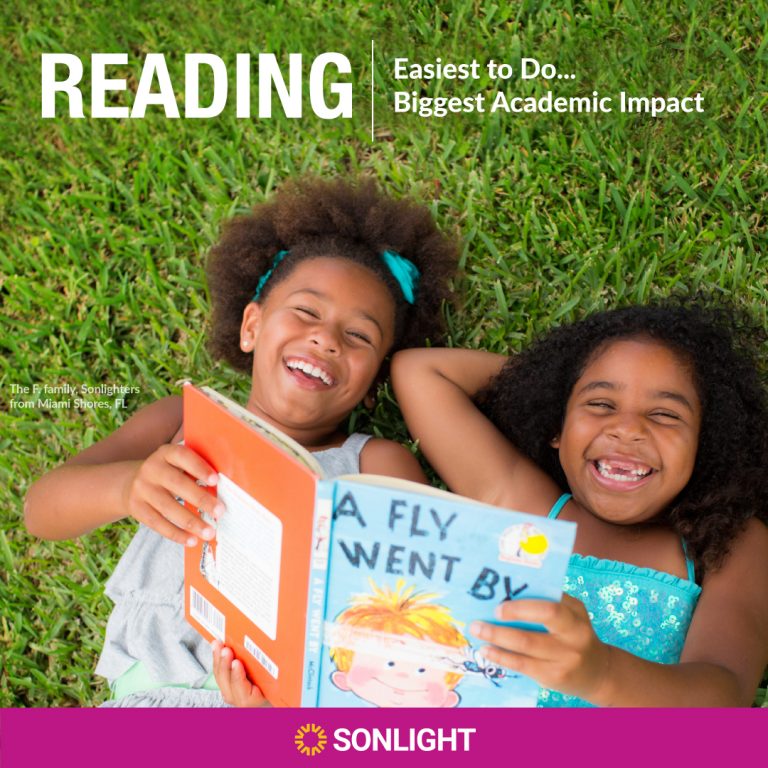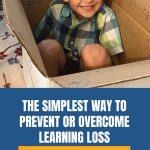It's easy to worry about learning loss. You've worked so hard to teach a child his math facts ... and now you're afraid he'll forget them.
I want to encourage you that no learning is ever wasted. When children make progress, their brains form new connections and they learn the satisfaction of a job well done. Even if they have to relearn something, they'll probably learn it more quickly and deeply the second time.
But of course, we'd prefer that children retain their hard-won skills.
Summer Slide & Covid Slide
We all know about summer slide. Reading skills are particularly vulnerable to losses over the summer. And with the dramatic changes in education during the 2020-2021 pandemic, we're seeing losses due to school closures and virtual instruction.
The good news: On average, it takes only six books in a summer to prevent summer reading loss.
We can translate summer to any 8-week period and realize that reading is the simplest and fastest way to recover from or avoid learning losses.
Recreational Reading & Reading Aloud
The great thing about extra reading is that there really are no strings attached. If they haven't yet, your children might discover that reading is fun. Once they want to read, they can really take off with books!
I encourage you to let your children read what they'd like this summer and any time of the year (within reason). If a reluctant reader becomes fascinated with Calvin and Hobbes, great. If your daughter wants to read thirty books about horses, let her.
Or supply your kids with particularly good picks. You can trust books from these collections to be uplifting and engrossing:
Free reading can be done solo, or you can read aloud to your children. They still get the same academic benefits when they listen to you read. As a bonus, they get the critical thinking that happens when you discuss together what you read. This quote by Stephen D. Krashen sums it up well:
"...no single literacy activity has a more positive effect on students' comprehension, vocabulary knowledge, spelling, writing ability, and overall academic achievement than free voluntary reading."
The Power of Reading
Research on the Value of Reading
Research backs the claim that reading boosts academic performance.
Frequent reading correlates with higher scores in vocabulary and spelling. That doesn't surprise me at all. But the study also shows that reading correlates with higher math scores. I love that! So reading great books can even prevent math slide!
[For a fun way to keep kids thinking about math, check out the MathTacular videos. I am biased (my two sons helped create the series) ... but I think they're a blast!]
This study suggests that books are even more important for children's academic success than their parents' financial status or level of education.
So whether or not you have impressive wealth or academic degrees, the simple act of reading to your children gives them a big leg up that can prevent or overcome learning losses such as summer slide or Covid slide.
One researcher suggests that the reason reading boosts scores in seemingly unrelated subjects like math is because the regular act of reading helps children practice taking in and processing new information. I think that makes a lot of sense.
Reading for Pleasure vs. Reading for School
This study specifically looks at reading for pleasure. So does it count when kids read books they "have to read" for school, for example their books in Sonlight curriculum? I think it does. For starters, many students come to thoroughly enjoy their Sonlight reading. They say it doesn't even feel like school.
But really, whether your children love it or sometimes complain, Sonlight students read far more than the vast majority of their traditionally-schooled peers or other homeschoolers.
And I'd say all that reading is worth it. You get to start with those precious times of snuggling with your preschooler on the couch. By the end, you're enjoying deep conversations with your teen about engrossing books that provide new perspectives on the world.
Homeschooling with Sonlight provides you the perfect way to encourage your children from ages 3 to 18 to frequently read quality books. If reading is so important, you might as well help your children love it. You serve them well when you provide worthwhile books that captivate and teach at the same time. But even if you are merely supplementing with afterschool read-alouds, you still get the benefit!
Become a Book Whisperer for Your Children
I found fresh encouragement about reading in The Book Whisperer, the story of a gifted teacher who encourages her classroom students to read far more than most of their peers.
The author, Donalyn Miller, gave many reasons why she is convinced reading is important. She says,
"I know from personal experience that readers lead richer lives ... than those who don't read."
"Reading changes your life. Reading unlocks worlds unknown or forgotten, taking travelers around the world and through time. Reading helps you escape the confines of school and pursue your own education. Through characters—the saints and sinners, real or imagined—reading shows you how to be a better human being."
I couldn't agree more.
So during these final days of winter, when the pandemic is starting to lose its grip on our routines, relish the world of books. As you read aloud to your children and as they read independently, be encouraged that you are catapulting your children's education forward in a painless manner.
Reading is truly the simplest way to prevent learning losses and repair any summer slide or Covid slide!









